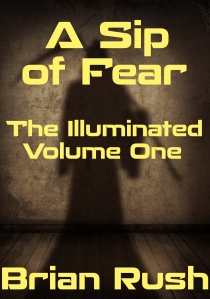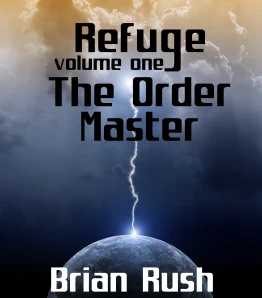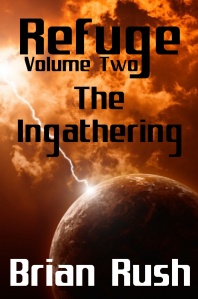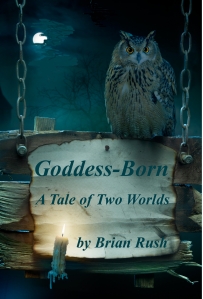In the context of a fantasy story, can magic and technology coexist? Can they occupy the same world with the same set of natural laws? If so, can they be practiced by the same individual? Or does magic interfere with technology or vice-versa?
As fantasy fiction reflects spirituality, being in fact the ancient art of mythcrafting, the way this question is answered (of course there is no one correct answer) resonates with another question: Are science and religion compatible? The fantasy question is open ended. One may do anything in fiction as long as the end result is a good story. But for fantasy as mythic enterprise, the story should have relevance to the world we live in and, at best, spiritual resonance.
The religious/scientific question is the place to start for that reason in my opinion. The more so as it touches upon a number of core questions for the spiritually inclined in modern society.
Let’s begin with the question of why there has ever been a conflict between religion (or between some religions, I should say) and science. The answer is twofold. Part of it is that prior to the development of scientific method, there was no clear distinction between the two or between either one and philosophy. As a result, scholars associated with religions often approached questions like the origin of the human species or the configuration of the visible universe, which today we would call scientific questions.
What is a scientific question? (I pose the question because the answer may not be obvious to everyone.) A scientific question is a question of fact, first of all. It’s an “is” question, not an “ought” question. It’s not a question of values, morality, or aesthetics; it answers how, not why (unless we’re talking strictly about human or animal behavior, and even then it’s more a how question than a why question, exploring the mechanics of motivation for animals with brains capable of being motivated — “Why do monkeys kill each other?” rather than “Why are we here?”). There is an enormous range of questions that cannot be asked, and therefore can’t be answered, using the methods of science, not because of their subject matter but because of the type of question they are. The domain of science may seem large (and it is), but as a subset of the set of all possible questions, it’s also fairly restricted.
The second criterion for a scientific question besides being a question of fact, is that it must be about something that is (at least in principle) observable. Science is empirical. It is based on a person standing at a realistic distance from a phenomenon and observing it. This is the first step in the scientific method. It is followed by someone coming up with an idea that describes what has been observed — a hypothesis. This is followed by further observation (incorporating bells and whistles like experimental controls where possible) to confirm the hypothesis or call it into question, followed by more thinking and hypothesizing and predicting, followed by more observation and so on. So if something is in the jurisdiction of science, it must be possible (at least in principle) to stand at a reasonable distance from the phenomenon and observe it. We don’t actually have to be able to do that in practice, but we have to at least be able to speculate that one of these days we might, as we develop better instruments or find better vantage points. (For example, it was acceptable to speculate about planets orbiting other stars long before we were actually able to observe any of them.)
So scientific questions are questions of fact about observable phenomena. All such questions are in the domain of science. Scientific method is the proper method for approaching such questions. It’s by far the best, most reliable method we have for doing so. Approaching them by any other method — such as raw intuition unverified by scientific method (which is not to say that intuition doesn’t play a part in science), or (even worse) the voice of authority and tradition, is not appropriate and leads to error. And this is the source of conflicts between science and religion: religion attempting to answer scientific questions by unscientific means. Religion shouldn’t do that. If religion doesn’t do that, there will be no conflict between science and religion. But does this leave religion with any questions to answer?
Yes, it does. First, there are all those questions which are important but not questions of fact. Religion traditionally attempts to answer moral questions, for example. These are definitely outside the zone of science, but still there is a right way and a wrong way to go about it, and moral questions, while they are outside the domain of science, aren’t really in that of religion. They may be approached from a non-religious perspective. Moreover, many religions become both authoritarian and conservative, and lock moral answers in stone so that they cannot adapt to changing material circumstances.
So what else? Well, there’s the second criterion of scientific jurisdiction, that the subject must be an observable phenomenon. It must be possible to stand a reasonable distance from it and observe it. Anything which is not an observable phenomenon is outside the reach of scientific method. Is there anything which is not observable, but which nonetheless we know to be real? Indeed yes: two things.
One of them is consciousness in the sense of qualia or subjective experience. We cannot observe our own consciousness experiencing the world, because it is always the observer and cannot be the observed. Nor can we observe the consciousness of someone else experiencing the world, although that’s less intuitively obvious. We can observe the workings of the brain of another person, or his behavior which suggests consciousness to us, but his consciousness itself is impossible to see, or to objectively verify its existence. (This is in fact a mystery. We should be able to observe another person’s consciousness if it were part of the world, even though it makes sense that we can’t observe our own. But we can’t. Therefore the other person’s consciousness isn’t part of the world. Back to this in a moment.)
The other thing that we know to be real, but cannot observe, is the universe as a whole. We can observe the parts of the universe and the processes of those parts, but the whole — encompassing not only all of space but all of time as well — can only be thought about, and perhaps experienced in another way besides observation. Why? Because again, observation requires standing at a reasonable distance from the phenomenon to be observed. We cannot do this with the whole universe, because the universe includes us. We cannot stand at a distance from everything and observe it, because that would require standing at a distance from ourselves. (This suggests a possible answer to the riddle of why we can’t see another person’s consciousness, too.)
Throughout history, these two things — the cosmos and consciousness — and the relationship between them, have been the subjects of spiritual understanding. This is the proper territory of religion. It cannot be approached by reason, let alone by scientific method. The universe cannot be observed from without, but it can be (and is, constantly) experienced from within, subjectively. Consciousness cannot be observed from without, but it can be (and is, constantly) the point from which experience happens, and its relation to the universe can be understood intuitively through that subjective experience, particularly in the course of expanded consciousness, spiritual experience, and mystical awareness.
This is the proper domain of religion. All else is politics. And this sort of thing is obviously compatible with science. The two have little to do with each other, except that science can provide new vistas on the wonders of creation, and new images for myth-making, and — most important of all — an intellectual ethic that rejects rigidity, authoritarianism, and dogma. As our world continues its metamorphosis from classical to advanced civilization, and as the ancient religions continue their upheavals, this will become more and more true, and the supposed conflict between science and religion seen more and more for the error (on religion’s part) that it always was. The change will come about from religion surrendering to science those questions which are properly scientific, and adopting the open-mindedness and anti-authoritarian intellectual ethic of science in regard to those questions which are properly religious, even though adopting the scientific method itself for those questions is impossible. (Otherwise they would also be scientific questions.) This is not an easy transition to make, and traditional religions are fighting it very hard and, alas, sometimes violently. But it is happening, and will continue.
Now, back to fantasy, magic, and technology.
Magic is something that partakes of both religion and science. Magical powers tend to arise in conjunction with spiritual awareness, and the techniques for developing magical powers are in many cases similar to those used to induce spiritual experience. At the same time, though, magic is itself an observable phenomenon, a part of the world about which questions of fact may be posed, and therefore in the domain of science. So in a sense, magic is the coexistence of religion and science, and it’s proper that it should coexist with technology.
Now, for a period of time in the past, this was (and in some works remains) not a convention of fantasy. For a long time, fantasy fiction separated magic and technology absolutely. There were various devices for doing this. Magic was sometimes placed in another world — it worked there, but not in our own world. Or sometimes this was not explicitly stated, but the world of the story (where magic worked) was low in technology, with the implication that magic was a primitive art not compatible with modernity. Sometimes it was asserted that both can work, but they are in fundamental conflict and cannot both work at the same time.
None of this is a literary requirement; none of it is necessary to tell a good story. So why was it done? Because it was a mythic requirement during a certain phase of the transition we have been making between the religions of the past and those of the future. A desire existed on the part of many people (including many readers and writers of fantasy) to preserve traditional religious beliefs and at the same time to keep the material benefits of modern science and technology. In real life, the two were compartmentalized, not in the natural way that recognizes the limits of scientific method, but in an artificial way that roped off certain ideas that could and should be proper subjects for scientific investigation and preserved them under religious authority instead.
The separation of magic and technology in fantasy fiction at the same time reflected this separation of religion and science in real life.
It’s a hopeful sign to me that today’s fantasy is beginning to abandon that separation. The idea that magic is a part of the world we live in — this modern world that also includes technological marvels — is asserting itself. While the skills and talents involved in developing and using magical powers versus those involved in engineering and the use of technology are different, they are perfectly compatible and exist in the real world.
Image credit: catmando / 123RF Stock Photo










